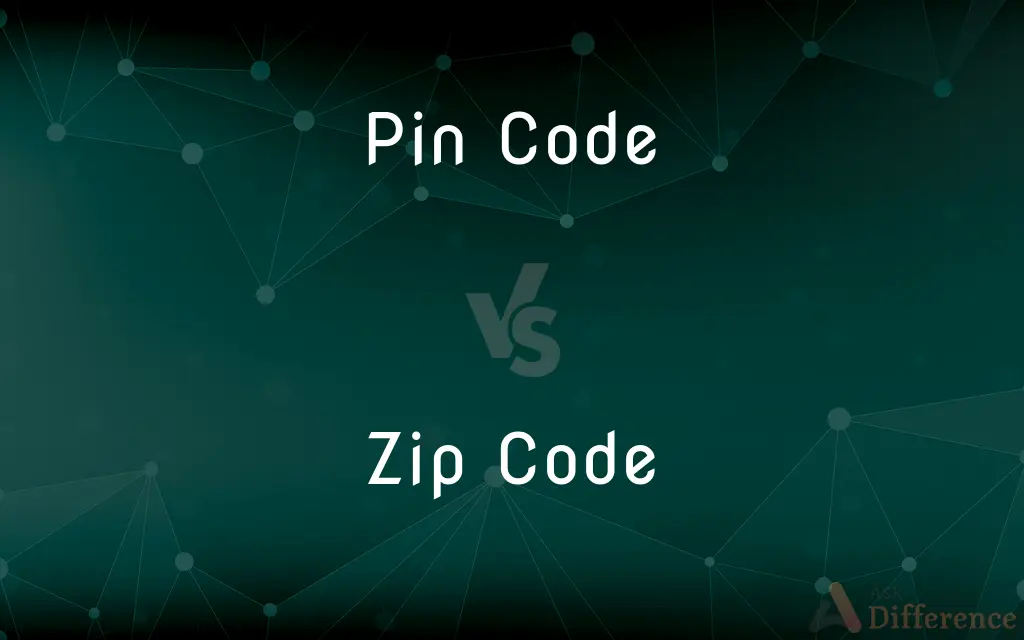PIN Code vs. ZIP Code — What's the Difference?
By Tayyaba Rehman — Published on October 13, 2023
A Pin Code is a postal code used in India for simplifying the sorting of mail by eliminating confusion over incorrect addresses, whereas a Zip Code is used in the United States for the same purpose.

Difference Between PIN Code and ZIP Code
Table of Contents
ADVERTISEMENT
Key Differences
Pin Code and Zip Code are terms used to describe postal codes in different countries, namely India and the United States, respectively. A Pin Code, or Postal Index Number, is a six-digit code in the Indian postal code system, designed to streamline the sorting and delivery of mail by eliminating confusion over incorrect addresses, area names, and similar issues. On the other hand, Zip Code, or Zonal Improvement Plan Code, is used in the United States, typically consisting of five digits, to ensure that mail is sent to the correct location.
Pin Code, introduced by the Indian postal department, helps in accurately identifying the destinations of mail and packages. The first digit of the Pin Code represents the zone, the second the sub-zone, and the third the sorting district within that zone. Similarly, the concept of Zip Code in the U.S. involves assigning unique codes to different areas, with the first digit representing a group of U.S. states, aiding in the swift and efficient sorting and delivery of mail.
The implementation of Pin Code and Zip Code have significantly impacted the postal systems of India and the United States respectively, reducing the time taken for mail and packages to reach their destinations and increasing the overall efficiency of postal services in these countries. These systems allow for the precise location of addresses and reduce errors in mail delivery, serving as an essential tool in modern postal services.
However, the term usage distinguishes them. Pin Code is strictly an Indian term, specific to India's postal system, reflecting the country’s methodology in sorting mail. Conversely, Zip Code is an American term, catering to the U.S. postal service's need to categorize regions within its territory for efficient mail distribution. Despite the differences in terminology and country of use, the underlying purpose and functionality of Pin Codes and Zip Codes are essentially the same.
Comparison Chart
Country of Use
Used in India.
Used in the United States.
ADVERTISEMENT
Number of Digits
Usually consists of six digits.
Usually consists of five digits.
Implementation Purpose
Simplifies the sorting and delivery of mail.
Ensures mail is sent to the correct location swiftly.
Structure
The digits represent the zone, sub-zone, and sorting district.
The first digit represents a group of U.S. states.
Efficiency
Increases the efficiency of the postal service in India.
Enhances the overall efficacy of the U.S. postal system.
Compare with Definitions
Pin Code
The Pin Code system in India was introduced to simplify the sorting of mail.
Thanks to the Pin Code, the mail in India can be sorted more efficiently and accurately.
Zip Code
Zip Code enhances the overall efficacy of the U.S. postal system.
Implementation of Zip Code has significantly improved the mail delivery system in the United States.
Pin Code
Pin Code helps in eliminating confusion over incorrect addresses.
By specifying the Pin Code on the parcel, the sender can avoid address-related confusions in India.
Zip Code
A Zip Code is a five-digit code used in the United States for sorting mail.
The Zip Code ensures the mail is sorted and delivered swiftly in the United States.
Pin Code
The digits in a Pin Code represent the zone, sub-zone, and sorting district.
By using the right Pin Code, the mail is sorted to reach the exact district, sub-zone, and zone.
Zip Code
Zip Code stands for Zonal Improvement Plan Code.
By using the correct Zip Code, the delivery of mail in the United States is facilitated.
Pin Code
Pin Code is specific to the postal system of India.
Every region in India has a unique Pin Code assigned to it.
Zip Code
The first digit in a Zip Code represents a group of U.S. states.
Through the Zip Code, every state in the United States is categorized for efficient mail sorting.
Pin Code
A Pin Code is a six-digit postal code used in India.
The Pin Code helps in ensuring that the parcel reaches the correct address in India.
Zip Code
Zip Code is specific to the postal system of the United States.
Every area in the United States has a distinctive Zip Code.
Zip Code
To affix a zip code to (an address or a letter).
Common Curiosities
What is a Pin Code?
A Pin Code is a six-digit postal code system used in India.
Where is the Zip Code used?
A Zip Code is used in the United States.
Is Pin Code specific to any country?
Yes, Pin Code is specific to the postal system of India.
Why was the Pin Code introduced?
The Pin Code was introduced in India to streamline the sorting and delivery of mail.
What does the first digit of a Pin Code represent?
The first digit of a Pin Code represents the zone in India.
How many digits does a Zip Code usually have?
A Zip Code usually consists of five digits.
What does the first digit in a Zip Code represent?
The first digit in a Zip Code represents a group of U.S. states.
Can the Pin Code help in reducing errors in mail delivery?
Yes, the Pin Code helps in reducing errors by ensuring mail is sent to the correct location in India.
Is the Pin Code and Zip Code used for the same purpose?
Yes, both are used for simplifying the sorting and delivery of mail in their respective countries.
Does a Zip Code increase the efficiency of the U.S. postal system?
Yes, the Zip Code significantly increases the efficiency of the U.S. postal system by aiding in swift sorting and delivery.
How does the Pin Code help the Indian postal system?
The Pin Code helps in the accurate identification of destinations, eliminating confusion over incorrect addresses in India.
Share Your Discovery

Previous Comparison
Gravitational Force vs. Gravity
Next Comparison
Dividend vs. EPSAuthor Spotlight
Written by
Tayyaba RehmanTayyaba Rehman is a distinguished writer, currently serving as a primary contributor to askdifference.com. As a researcher in semantics and etymology, Tayyaba's passion for the complexity of languages and their distinctions has found a perfect home on the platform. Tayyaba delves into the intricacies of language, distinguishing between commonly confused words and phrases, thereby providing clarity for readers worldwide.
















































